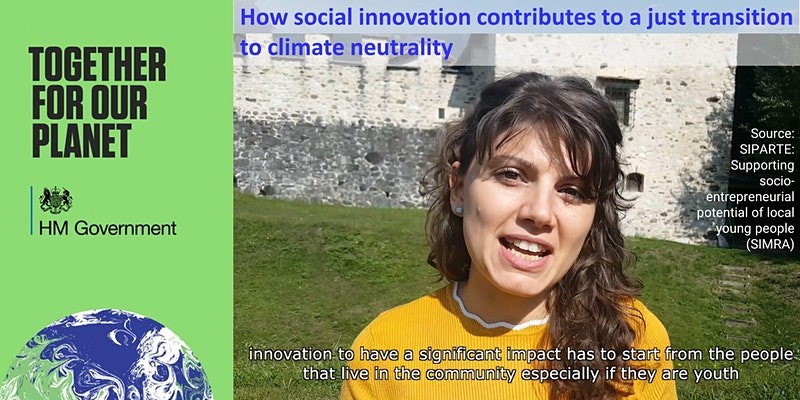How social innovation contributes to just transitions to climate neutrality
A side event at the COP 26 in Glasgow, organised on 10.11.2021 by the James Hutton Institute, Aberdeen, Scotland/UK
 The James Hutton Institute, UK, lead partner of the HORIZON 2020 research project SIMRA (Social Innovation in Marginalised Rural Areas), seized the opportunity to emphasize the importance of social innovation on the long and winding path of sustainability transition in our societies. David Miller, the chair of the event, invited a panel of researchers and practitioners to illuminate different aspects of social innovation for climate transition.
The James Hutton Institute, UK, lead partner of the HORIZON 2020 research project SIMRA (Social Innovation in Marginalised Rural Areas), seized the opportunity to emphasize the importance of social innovation on the long and winding path of sustainability transition in our societies. David Miller, the chair of the event, invited a panel of researchers and practitioners to illuminate different aspects of social innovation for climate transition.
After a general introduction to the topic of social innovation in rural areas by Maria Nijnik from the James Hutton Institute, Laura Secco from the TESAF Institute (Department of Land, Environment and Agroforestry systems) of the University of Padova, IT, gave an overview on the possibilities of evidence-based evaluation of social innovation and its impacts in marginalized rural areas.
Then the presentations switched to experimental practice on the island of Guadeloupe, FR. Jean-Marie Flower, ecology scientist and carbon accountant, and Carla Barlagne, researcher in social innovation and agricultural and rural economics, gave an account on VALAB (Integrated Ecosystemic value-enhancement of the Guadeloupe Forest Agrobiodiversity), an excellent example of action research linking local farmers and forest owners with scientists. Actually VALAB is one of the Innovation Actions having sprung up from the SIMRA project.
Before the closing statements of the one-hour panel discussion, Robert Lukesch, consultant and researcher focusing on inclusive and sustainable governance, and LDnet board member, gave an impulse on the importance of a multi-scalar and multi-actor approach including social and institutional innovation in a well-coordinated manner. With a wink, he epitomised the key ingredients of this approach in LIES:
L for Limits: It’s about the importance of framework rules and conditions, to be fixed by national governments and EU, but also convened upon on a global scale (UN).
I for Incentives: Nudges, baits and open invitations by which climate-friendly behavior and organisational routines are promoted: such policy incentives have to be orchestrated mainly on national and regional scales.
E for Examples: That’s where the innovative actors come in! It’s about social innovations emerging locally and eventually spread out and scaling up until they may change socio-technical regimes in the respective sector or functional area.
S for Stories: As the philosopher Yuval N. Harari put it: Humans think in stories! What is the innovation worth if nobody (except those who are directly involved) knows about it? It is about telling the world what happens with people and communities developing ‘grand-children-proof’ practices and life concepts (E), how these can be enabled and even triggered with policy stimuli (I), and which rail guards (such as the ban of pollutants or the sanctioning of damaging practices) have to get fixed by the responsible authorities to avoid backlashes (L).
Be aware: These Stories only work if they are told with honest intent and without greenwash.
Leave a Reply
You must be logged in to post a comment.